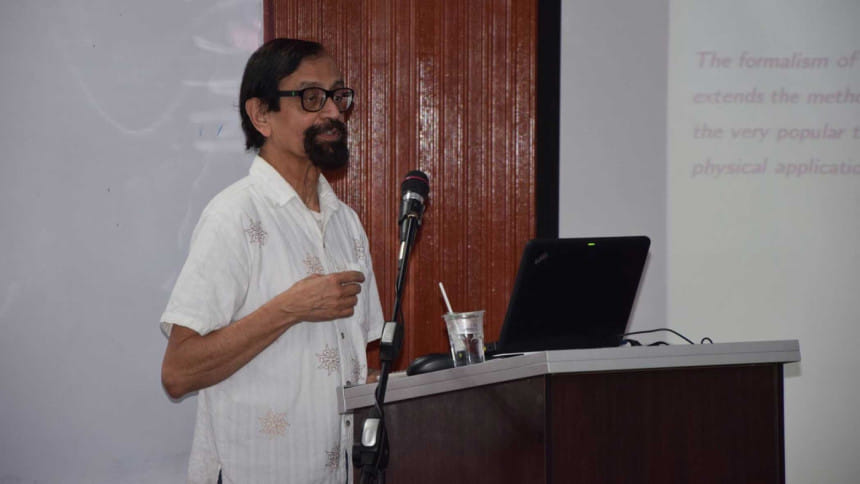A man who sought 'transcendent beauty' through science

This past January 24 marked the sixth death anniversary of a luminary of science in the person of Syed Twareque Ali, who was a gift from Bangladesh to the world of science. "A deep thinker, who sought transcendent beauty. The truths of science, the elegance of mathematics in the quantum domain, were part of the ever-unattainable beauty for which he (and all of us) yearn," is how a distinguished colleague, Professor Gerald Goldin of Rutgers, had described him at a memorial held in June 2016 in Rio de Janeiro, Brazil. His entire adult life was devoted to science, in his teaching, research, communication via seminars, courses, and conferences all over the globe. True to his character, he died too in the line of work, while at a conference in Kuala Lumpur, Malaysia.
I had the good fortune of meeting him first in the second half of 1965 when he had just joined the Atomic Energy Commission as a scientist, while I was a mere class XII student. At the behest of my roommate Md Shahjahan, the meeting was arranged by Twareque bhai's younger brother Harun, who was our classmate at Dhaka College. Like many aspiring higher-secondary students of the day, like many we both of us were planning to study Physics at the university. Realising this meeting to be a pure waste of his valuable time, Twareque bhai promptly led us to the canteen for some tea/snacks. Shahjahan, incidentally, went on to become a distinguished graduate of the Dhaka University (DU) Physics Dept, but that is another matter.
Twareque bhai's childhood was quite unremarkable except for his seriousness of academic intent and in his yearnings for academic excellence that was evident to all very early on. The schools were all catholic, as Yusuf, his younger brother recounts. Starting with St Gregory's at Lokhkhibazar, then moving onto St Anthony's in Lahore, and finally in middle school returning to Dhaka's famous St Gregory's. It was from this school, he stood first in entire Bangladesh (then, East Pakistan) in the old Matriculation examinations held in 1959.
Having obtained First Cass in both BSc Honours and MSc in Theoretical Physics, and following a stint at the Atomic Energy, he went to the University of Rochester to work with a renowned scholar, Gerard Emch, specialising in Quantum Mechanics, which became his passion for life. Following the PhD, during 1973-81, he continued to hone and eventually perfect his training and skills through a series of multi-year post-doctoral and visiting scholar positions in several locations. Starting with Trieste (Laureate Abdus Salam's Institute of Theoretical Physics, 1973-75), University of Toronto (1973-78) and Technical University of Claustahl (1979-81), he embarked on an extensive research collaboration with a number of fellow scientists who became close friends, mentors, and co-researchers for life.
I was overjoyed when in the Fall of 1981 I learned that Twareque bhai would soon be joining to a fulltime position at Concordia University in Montreal, where I had been teaching economics for some time already. I promptly met him and by then, vis-à-vis 1965, he had mellowed a lot, and we became very good friends since. Concordia became his new home for the remaining 35 years of relentless work till his final rest.
What is Quantum Mechanics, after all, for us lay readers? How does that differ from classical mechanics à la Newton? Science dictionaries state that Quantum Mechanics is the branch of physics relating to the very small, molecules and atoms, and their constituents such as electrons, protons, neutrons. The latter, namely the constituents, are known as "fundamental" or "elementary" particles, which are subatomic, implying that these are not composed of other particles, hence fundamental. Another interpretation of fundamental particles is that they are the "smallest and most basic constituents of matter."
Classical mechanics, by contrast deals with physical objects as well as heavenly bodies. Rudimentary ideas, historically speaking, of their behaviour were promulgated by Aristotle (384-322 BC), with modest advances made in between by Islamic scholars during 1000-1200 AD (e.g., Ibn Sina, 980-1037 AD and Al-Baghdaadi, 1080-1164/65). However major advances had to wait till the advent of Galileo Galilei (1564 -1642), a Polymath from Pisa, and of course, Sir Isaac Newton (1643 - 1727). The problem with classical mechanics is that it is not very useful at the level of atoms and electrons, hence the birth of "quantum" ideas.
Physicists Max Planck (1918), Albert Einstein (1921), and Niels Bohr (1922) are generally regarded as the chief exponents of Quantum Mechanics, and each had been honoured with the Nobel Prize in quick succession (with the dates in brackets above). Where does Twareque bhai's work fit in here? There was a major scope of uncertainty and hence, probability theory in quantum physics. To quote Coolman (2014), "In classical mechanics, objects exist in a specific place at a specific time. However, in quantum mechanics, objects instead exist in a haze of probability; they have a certain chance of being at point A, another chance of being at point B and so on". This interpretation may have prompted the eminent Quazi Motahar Hossain to coin the Bangla word jhalak to mean "quantum", with which apparently the great Satyen Bose had concurred. Incidentally both were fond of lecturing classes in Bangla at DU in late 1920s/early 30s.
A large body of work by Twareque bhai fall in a broad category knowns as stochastic quantum mechanics. One of Twareque's co-researchers, Franklin E. Schroeck, Jr., also a fellow Rochester mentee of Gerard Emch, stated in an obituary "the three of us founded the field together" (Journal of Geometry and Symmetry in Physics, 41 (2016), 105-111). The trio consisted of Eduard Prugovecki (University of Toronto, one of Twareque's mentor), Twareque and Schroeck (U Florida).
His subsequent work is harder to describe in plain English, but to those familiar, these involved geometrical methods in quantum mechanics, "phase space", "quantisation", and "coherent states". Over and above the names cited already, Twareque bhai met two Jean-Pierres in his travels in the late 1980s, one Antoine (of Université Catholique de Louvain, Belgium) and Gazeau (Université de Paris, VII). The three (Ali, Antoine and Gazeau) bonded extremely well and over the next 26 years, they went on to publish a large body of work, including 3 books, over a dozen journal articles and several other papers, typically on the overall rubric of "coherent states".
Twareque bhai served as a Visiting Professor to many universities the world over. "Twareque travelled a lot; we kept meeting each other all over the world, until the most recent times. We often attended the same meetings, in addition to visiting each other at our home universities, including being respective invited professors. To name a few of the places we travelled together, there were Québec, Germany (Claustahl), Poland (Białowieza), Cuba, France, Italy, Bangladesh (Dhaka), China (Tianjin), India (Bangalore), and many others." (J-P Antoine, Centre de Recherches Mathématiques, CRM Bulletin 22(1), 2016, p9).
In a way, Twareque bhai spread "advanced science" in the not-so-advanced World; he had instituted regular advanced seminars and courses in Benin (West Africa), China, Cuba, Poland, and later Malaysia. He devoted a lot of time in the organisation, fund raising and participation in the above events. In May 1989, he helped me to organise and facilitate an international conference on Bangladesh Floods at Concordia and devoted a generous amount of time in the process.
"All his papers have a luminous clarity. His non-scientific writings have the same quality, including his poetry; I remember a memorable poem composed by him in Białowieza" (J-P Antione, CRM, 2016, op cit). Another remarked that "he was someone with whom one could discuss the meaning of life's joys and disappointments without self-consciousness." (G Goldin, CRM, 2016, op cit).
On lighter themes, those familiar with Twareque bhai had known that he was quite a polyglot; he had full functionality in teaching and scholarly writing in French, German and Italian, not to speak of English. Socially he was highly proficient in several major South Asian languages, and this proclivity was apparently evident even when a child. As his brother, Yusuf bhai recounted, in their daily commute to St Anthony's from home, both the brothers picked up sufficient Urdu to sing along with Tangewala lyrics such as Ai Mere Dil Kahin, Ye Raat Ye Chandni, etc. He had an uncanny memory that transcended beyond science to more ordinary joys of life, poems, jokes, ghazals and bandish, and these too in several languages. As Yusuf bhai had put it, he "could recite endless poems from the sublime to the ridiculous".
The Group Theory Colloquium in Tianjin in 2012 honoured Twareque bhai on his 70th birthday. The journal, The Geometry and Symmetry in Physics, ran an Obituary in its 2016 issue no. 41 as did the Centre de Recherches Mathématiques, an institute he had helped found. Many renowned scholars had contributed to these obituaries as a mark of honour for Twareque Ali. May his soul rest in eternal peace.
Syed M. Ahsan, PhD is professor emeritus of Economics at Concordia University in Montreal, Canada.

 For all latest news, follow The Daily Star's Google News channel.
For all latest news, follow The Daily Star's Google News channel. 



Comments